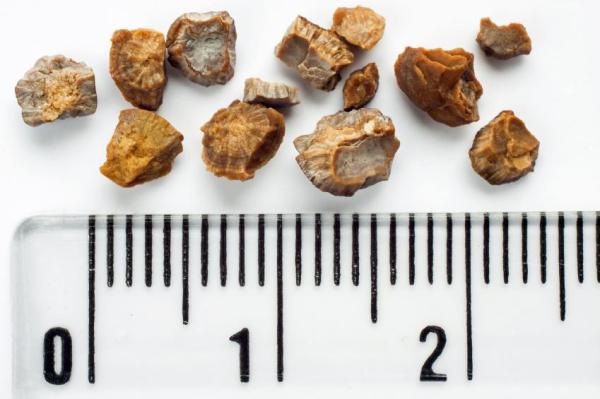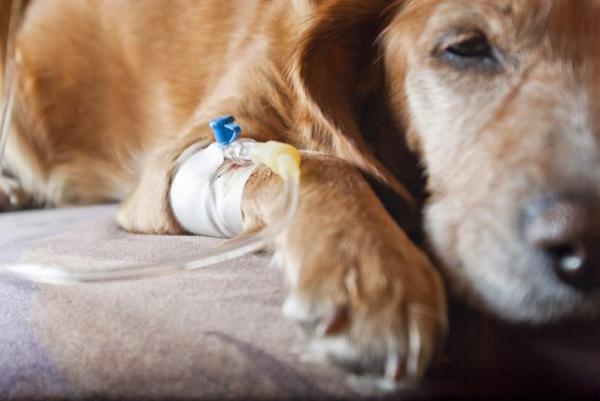Renal Failure in Dogs: Main Causes of Kidney Disease



See files for Dogs
The renal system in dogs includes the kidneys, ureter, bladder and urethra. It is part of the larger urogenital system. The main purpose of this system is to remove waste products from the body, but it is also used to regulate the blood and control levels of various substances in the body. Renal disease is also known as kidney disease and specifically concerns the kidneys, although other parts of the renal system can be affected. When the functioning of the kidneys becomes very low, the dog will be suffering renal failure which will eventually be fatal. Early treatment can help limit damage to the kidneys and prevent renal failure.
In this AnimalWised article, we look at renal failure in dogs by focusing on the main causes of kidney disease. By knowing what can cause kidney failure in dogs, we can best prevent this from happening and help our dogs live a longer life.
Renal diseases in dogs
The kidneys are two vital organs located on both sides of the spine, behind the last rib. They create urine by filtering impurities and waste materials from the blood. This urine passes to the ureters, ducts which are attached to the bladder. From there, the urine is passed onto the urethra where it is voided from the body.
In addition to purifying the body of waste materials, the kidneys play an important role in the regulation of fluids and electrolytes. Therefore, kidney problems can affect the entire body, manifesting in various different symptoms. One of the first symptoms of renal disease in dogs is problems affecting elimination of urine from the body. If a dog's kidney tissue is damaged, it will not be able to recover.
The most common causes of kidney disease in dogs are:
- Kidney stones
- Pyelonephritis
- Nephritis
- Renal insufficiency
Kidney failure in dogs is often difficult to detect in early stages because the problems are asymptomatic. By the time symptoms do appear, there may have already been a lot of irreparable damage done to the body. This is one of the many reasons regular veterinary checkups are so important in caring for our dogs.
1. Kidney stones in dogs
In our review of kidney problems in dogs, we first look at kidney stones. A kidney stone is known as a calculus, a solid substance formed by various minerals precipitated by the body. The process of creating kidney stones is greatly influenced by the food a person eats, their blood pH levels and hydration.
There are various symptoms caused by kidney stones, including:
- Pain
- Difficulty urinating
- Incontinence
- Blood in the urine
- Gritty substances in urine
Kidney stones can be of varying size and some may be able to pass naturally without intervention. You may see your dog passing a stone when they are urinating, but this can be hard to witness if you are not looking out for it. If you do see them passing a stone, it is best to collect it and take it to the vet. This way, they can better understand the cause of kidney stone formation in your dog.
If left unchecked, kidney stones in dogs can cause perforations in tissue, obstructions and renal failure. The treatment with depend on the type of calculus present, since there are several different possible compositions. The minerals which make up these calculi can include calcium (the most common), struvite, uric acid, bile salts and others.
In any case, if a dog is suffering from kidney stones, a specific diet is required. This will help to reduce the stones and prevent them forming again in the future. Antibiotics will be prescribed to manage any infections which may have occurred. In more acute cases, surgical intervention may be required.

2. Pyelonephritis in dogs
The next kidney problem in dogs is known as pyelonephritis, an inflammation of the kidneys caused by bacterial infection. The infection will also affect the ureter. Typically, it is caused by a complication of a bladder infection, implying bacteria have travelled from the bladder to the kidneys. Additionally, there may be an obstruction or birth defect which can influence the prevalence of these types of infection.
The disease may appear acutely or chronically. In acute pyelonephritis, symptoms may include;
- Fever
- Anorexia
- Vomiting
- Pain
The pain may be felt in the lower spine or during urination. You can see the dog adopting an abnormal posture when urinating, usually manifesting as rigid legs and a hunched body. Chronic pyelonephritis may occur after a case of acute pyelonephritis. The clinical picture is characterized by anorexia, elimination of a greater amount of urine and an increase in water intake.
Pyelonephritis is a kidney infection which can cause renal failure. It is essential we take the dog to the vet as soon as it is suspected and to follow their treatment guidelines closely. This treatment consists of a course of antibiotics and is usually prolonged, lasting around 2 months. It is a difficult infection to eliminate completely and relapses are common. Strict monitoring will need to be carried out to verify the effectiveness of the treatment and confirm clearance of the infection.
3. Nephritis and nephrosis in dogs
Another common cause of kidney problems in dogs is one which can affect the kidneys to the point of reaching renal failure. Nephritis is an inflammation associated with diseases including hepatitis, ehrlichiosis, pancreatitis or borreliosis (also known as Lyme disease). On the other hand, nephrosis is due to degenerative changes in the kidney due to poisoning. This poisoning could be due to eating something they shouldn't or by taking certain medications.
In both cases, the dog will display nephrotic syndrome alongside edema, ascites and pleural effusion. Nephritis can be resolved by treating the cause which has previously lead to the condition. For nephrotic syndrome, it results in renal failure which we will discuss further in the next section.
4. Kidney failure in dogs
Renal insufficiency is one of the most common and well-known kidneys diseases in dogs. It is defined as the inability to eliminate waste from the body. As with pyelonephritis, kidney failure in dogs can occur acutely or chronically. Chronic cases occur most commonly in older dogs which have been affected by long-term kidney issues. Kidney failure in younger dogs is relatively uncommon. Renal insufficiency is a failure of the kidneys to carry out their intended purpose and is caused by obstruction, rupture of the bladder, shock, heart failure, intoxication and others.
One problem to keep in mind is that renal failure will not produce symptoms until the disease is already advanced. In a blood test, elevated creatinine levels is one of the main signs of kidney failure in dogs. Recently, testing SDMA levels has been recommended for detecting kidney failure as this rises earlier than creatinine. This means the disease can be treated earlier and can help to improve the dog's prognosis.
Symptoms of kidney failure in dogs include:
- Increased water intake
- Elimination of urine
- Dehydration due to difficulty in getting rid of waste
- Depression
- Anorexia
- Deterioration in the dog's coat quality
- Ammonia smell on breath
- Wounds in the mouth
- Fluid retention
- Vomiting
- Diarrhea
- Hemorrhaging
Many of the above symptoms are a result of toxins which are not being eliminated. Treatment of renal failure in dogs includes administering a specific diet, maintain good hydration and being given appropriate medications to control the various symptoms. Sometimes, vitamins are also prescribed. Any worsening of the dog's medical picture will require an immediate trip to the veterinarian for suitable assessment.
Can kidney failure in dogs be reversed?
Kidney failure in dogs usually results in permanent damage. Sometimes, if the damage is small or affects only one kidney, the other can compensate for any loss of function. This means a dog could continue to live without symptoms, although they will be more susceptible to further damage in the future. The progression of kidney failure in dogs can be stopped, but it cannot be reversed.
The more widespread the tissue damage, the worse the dog's prognosis. However, it is important to note that dogs with kidney disease can live for years with good veterinary treatment and adequate follow up. Another way of putting this is that canine kidney failure is not curable, but it is treatable.

Food for dogs with kidney problems
For this different types of kidney problems in dogs, there are different foods which are specially formulated. Typically, the salt content will be reduced and they use high quality proteins to lighten the work of the kidneys. Additionally, the percentage of phosphorus is also controlled and sick animals will often have too high a level of the mineral. A wet food diet is usually recommended as it is important to promote hydration.
If you would prefer to provide your dog with homemade food, you should discuss with your veterinarian what kind of diet is suitable. While there are general diets which are appropriate for dogs with kidney disease, the dog may have a concurrent condition which will affect their food intake. Discussing homemade diets with your vet can avoid exacerbating the situation unintentionally. In general, the foods should have easily digestible protein and be low in phosphorus and sodium.
Can a dog survive with only one kidney?
Occasionally, kidney disease may require the removal of one of the kidneys. This is something which can cause great concern to dog guardians. They will understandably ask questions about survival rates of dogs which have had their kidney removed.
Dogs can live with only one kidney, but it will be necessary to receive strict veterinary control and adequate food. In doing so, you can take some of the stress of the remaining kidney. It is possible in some cases, dialysis will be required to maintain renal function.
This article is purely informative. AnimalWised does not have the authority to prescribe any veterinary treatment or create a diagnosis. We invite you to take your pet to the veterinarian if they are suffering from any condition or pain.
If you want to read similar articles to Renal Failure in Dogs: Main Causes of Kidney Disease, we recommend you visit our Other health problems category.
- Carlson and Giffin. (2002). Practical canine veterinary manual . Madrid, Editorial: el Drac.







